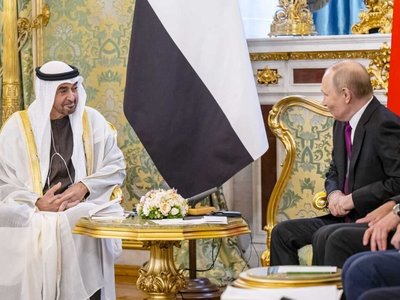Khadijah al-Lawati: Oman’s First Female Ambassador
Khadijah al-Lawati’s journey reflects decades of progress for Omani women in leadership roles.
The late Sultan Qaboos bin Said of Oman emphasized the importance of women's empowerment from the very beginning of his reign in July 1970. He focused on lifting Omani women from the challenges of historical inequities to a new era of participation in national development, advocating for equal opportunities in all state positions as a right and a means to compensate for past adversities.
In his inaugural speech on July 27, 1970, he stated, "The government and the people are like one body; if one member does not perform its duty, the rest of the body will falter." His commitment to women's involvement in national progress was reiterated on November 16, 2009, highlighting the government's efforts to provide education, training, and job opportunities for Omani women and ensuring their contribution to various developmental fields.
Among those benefiting from these initiatives is Khadijah Hassan Suleiman al-Lawati, a member of the al-Lawati tribe, which has been part of the Omani demographic since the 17th century.
Born in 1952 in Mutrah, near the capital Muscat, Khadijah was raised in a family that prioritized education.
Her father, Hasan Suleiman al-Lawati, sought opportunities abroad for his family, which led them first to Kuwait and then to Iraq.
There, Khadijah received her formal education and graduated from Baghdad University in 1974 with a degree in English literature.
Following her studies, Khadijah furthered her education in the United Kingdom, obtaining a diploma in business management and community development from Huddersfield College, returning to Oman to contribute to the nation's renaissance under Sultan Qaboos's vision.
Khadijah began her professional career in 1975, initially working in the Ministry of Development for a brief period before transitioning to the Ministry of Foreign Affairs.
Starting as a second secretary, she gradually rose through the ranks to become a first secretary, advisor, and eventually a minister-counselor responsible for overseeing Oman's relationships with international organizations and development programs.
Her career took a significant turn on September 14, 1999, when she was appointed as Ambassador Extraordinary to the Netherlands.
Subsequently, in May 2000, she was also named Ambassador Extraordinary and Plenipotentiary to Belgium and Luxembourg.
Khadijah made history as the first Omani woman to hold an ambassadorial position, a role that came with the expectation of demonstrating her capacity as a pioneering female diplomat.
She expressed the belief that her success would pave the way for more women to join the diplomatic ranks.
Khadijah’s appointment marked a notable achievement in Oman’s diplomatic landscape.
By 2018, the representation of female ambassadors from Oman had reached 7% of the total number of Omani ambassadors abroad.
Following her, other women, including Haneen bint Salem al-Mughairy and Kifayah bint Khamees al-Raisi, secured notable ambassadorial roles in key countries.
In an interview, Khadijah revealed her initial hesitation to take the ambassadorial position in the Netherlands due to personal circumstances, including her children's education and cultural adjustments.
However, motivated by the then Secretary-General of the Ministry of Foreign Affairs, Haitham bin Tariq, she accepted the role, which involved relocating for ten years while her husband remained in Oman.
During her tenure, Khadijah was instrumental in enhancing Omani-Dutch relations, rooted in historical trading ties that date back to the 17th century.
Significant agreements were fostered during her time, including a notable 2002 partnership between the Omani government and the Port of Rotterdam to enhance operational capabilities at the Port of Sohar, a critical element of Oman’s Vision 2040 economic strategy.
Khadijah also worked on cultural promotion initiatives, including establishing a small Omani village at a Dutch museum, organizing an Omani heritage exhibition in Amsterdam, and launching educational programs about Oman for European schoolchildren.
Her efforts culminated in the establishment of two chairs for postgraduate studies named after Sultan Qaboos in major Dutch universities.
After a successful decade in the Netherlands, she returned to Oman, where she held various positions in the Ministry of Foreign Affairs until her retirement.
Khadijah’s contributions have been recognized, particularly on Omani Women's Day in October 2020, when she was honored among the women who made significant impacts in their fields.
Additionally, her husband received recognition from the Arab Labor Organization in 2010 for his contributions in his domain.
Khadijah al-Lawati’s career is a testament to the evolving role of women in Oman and reflects broader societal changes initiated by the country's leadership.
In his inaugural speech on July 27, 1970, he stated, "The government and the people are like one body; if one member does not perform its duty, the rest of the body will falter." His commitment to women's involvement in national progress was reiterated on November 16, 2009, highlighting the government's efforts to provide education, training, and job opportunities for Omani women and ensuring their contribution to various developmental fields.
Among those benefiting from these initiatives is Khadijah Hassan Suleiman al-Lawati, a member of the al-Lawati tribe, which has been part of the Omani demographic since the 17th century.
Born in 1952 in Mutrah, near the capital Muscat, Khadijah was raised in a family that prioritized education.
Her father, Hasan Suleiman al-Lawati, sought opportunities abroad for his family, which led them first to Kuwait and then to Iraq.
There, Khadijah received her formal education and graduated from Baghdad University in 1974 with a degree in English literature.
Following her studies, Khadijah furthered her education in the United Kingdom, obtaining a diploma in business management and community development from Huddersfield College, returning to Oman to contribute to the nation's renaissance under Sultan Qaboos's vision.
Khadijah began her professional career in 1975, initially working in the Ministry of Development for a brief period before transitioning to the Ministry of Foreign Affairs.
Starting as a second secretary, she gradually rose through the ranks to become a first secretary, advisor, and eventually a minister-counselor responsible for overseeing Oman's relationships with international organizations and development programs.
Her career took a significant turn on September 14, 1999, when she was appointed as Ambassador Extraordinary to the Netherlands.
Subsequently, in May 2000, she was also named Ambassador Extraordinary and Plenipotentiary to Belgium and Luxembourg.
Khadijah made history as the first Omani woman to hold an ambassadorial position, a role that came with the expectation of demonstrating her capacity as a pioneering female diplomat.
She expressed the belief that her success would pave the way for more women to join the diplomatic ranks.
Khadijah’s appointment marked a notable achievement in Oman’s diplomatic landscape.
By 2018, the representation of female ambassadors from Oman had reached 7% of the total number of Omani ambassadors abroad.
Following her, other women, including Haneen bint Salem al-Mughairy and Kifayah bint Khamees al-Raisi, secured notable ambassadorial roles in key countries.
In an interview, Khadijah revealed her initial hesitation to take the ambassadorial position in the Netherlands due to personal circumstances, including her children's education and cultural adjustments.
However, motivated by the then Secretary-General of the Ministry of Foreign Affairs, Haitham bin Tariq, she accepted the role, which involved relocating for ten years while her husband remained in Oman.
During her tenure, Khadijah was instrumental in enhancing Omani-Dutch relations, rooted in historical trading ties that date back to the 17th century.
Significant agreements were fostered during her time, including a notable 2002 partnership between the Omani government and the Port of Rotterdam to enhance operational capabilities at the Port of Sohar, a critical element of Oman’s Vision 2040 economic strategy.
Khadijah also worked on cultural promotion initiatives, including establishing a small Omani village at a Dutch museum, organizing an Omani heritage exhibition in Amsterdam, and launching educational programs about Oman for European schoolchildren.
Her efforts culminated in the establishment of two chairs for postgraduate studies named after Sultan Qaboos in major Dutch universities.
After a successful decade in the Netherlands, she returned to Oman, where she held various positions in the Ministry of Foreign Affairs until her retirement.
Khadijah’s contributions have been recognized, particularly on Omani Women's Day in October 2020, when she was honored among the women who made significant impacts in their fields.
Additionally, her husband received recognition from the Arab Labor Organization in 2010 for his contributions in his domain.
Khadijah al-Lawati’s career is a testament to the evolving role of women in Oman and reflects broader societal changes initiated by the country's leadership.











